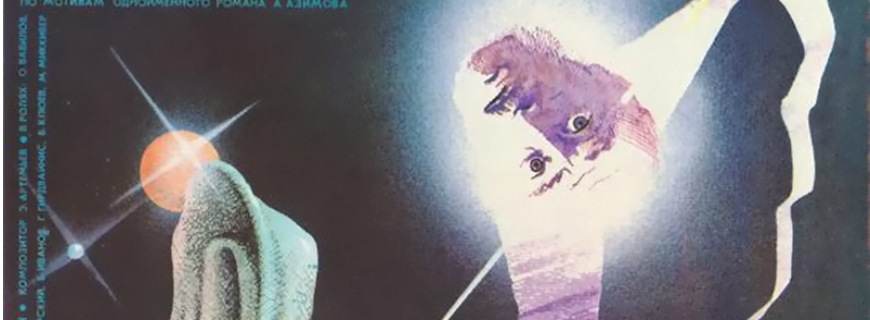Space Oddities: End of Eternity (Andrei Yermash, 1987)

End of Eternity (Andrei Yermash, 1987)
Each month, Raz Greenberg reviews an overlooked piece of science fiction, fantasy or horror – be it a film, a television episode, a comic or a game – one that should have gotten more attention when it first came out and should still be remembered, in his opinion. This month, he explores the only good cinematic adaptation of one of the literary giants of science fiction.
SF literature giant Isaac Asimov never had much luck when it came to cinematic adaptations of his works. From empty blockbusters as the 2004 version of I, Robot to some truly abysmal pieces (not one but two attempts were made at a filmed versions of the classic story Nightfall, and each of them is a worthy candidate for the title of the worst science fiction film in history), Hollywood never managed to turn Asimov’s work into a good film.
But Asimov’s works have also been adapted outside Hollywood, and the fact that filmmakers from all over the world have found inspiration in his stories (the most recent Asimov adaptation, according to IMDB, was produced in Iran) speaks highly for these stories’ cross-cultural appeal. One such notable adaptation is of Asimov’s time-travel novel End of Eternity, directed in the Soviet Union by Andrei Yermash in 1987 under the title Konets vechnosti.

Like the novel, the plot follows Andrew Harlan (played by Oleg Vavilov), a member of the Eternity organization of time travelers who monitor and adjust the course of history. A meeting with a beautiful woman named Noyes Lambert (Vera Sotnikova) makes him doubt his mission and the plans that eternity has for the human race.
Even considering the fact that the film was produced in the late ’80s as the Soviet Union was slowly falling apart, End of Eternity seems like an odd choice for an adaptation by a Soviet filmmaker. Asimov has built most of his stories around a paradigm that always works – be it the famous Three Laws of Robotics or the Seldon Plan – and Yermash could have easily found an ideological parallel for communism, the great paradigm the Soviet Union was founded upon in Asimov’s body of work. But he chose to adapt End of Eternity – a novel in which the paradigm fails. There is something truly subversive about the way Yermash portrays Harlan’s superiors as a bunch of mean-spirited bureaucrats who are only interested in maintaining their positions. Add the general grim design of Eternity’s facilities in the film, that make them look like a dimly-lit rundown factory, and you get a very unflattering metaphor for the Soviet establishment.
But Yermash’s film is equally critical of the other end of the ideological spectrum. Lambert, who plants the seeds of doubt in Harlan’s mind, is presented in the film as a manipulative femme fatal (Sotnikova, one of the great beauties of Soviet cinema, gives a splendid performance in the film) who leads decadent life in her luxury house, representing corrupt capitalism at its worst. And so, in Yermash’s film, Harlan is a tragic figure – a man who slowly realizes that there is no grand paradigm, no perfect ideology, and no true solution to humanity’s problems. He is a time traveler with no future.
Konets vechnosti is not a perfect film. It’s a bit too talky, and in contrast to the rather complex plot, characters often feel paper-thin (this has always been a problem with Asimov’s writing as well). The ending is also not very satisfying, and I suspect that it was done in order to soften the rest of the film’s political message. But the film remains an excellent adaptation that remains respectful to Asimov’s original work while imprinting it with a unique style and content.
Where to get it: Unfortunately, the film has never been officially released in English-speaking territories, and as far as I could find out, has been released on home video or any digital format in Russia as well. Perhaps someone reading this post will decide to pick it up for digital distribution?




